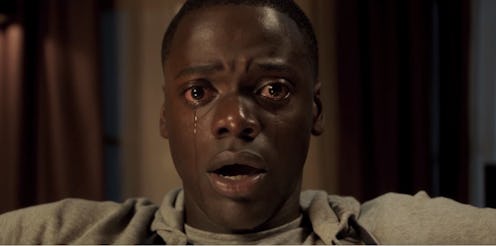
By now, audiences know that Get Out is so much more than just a horror flick. Director and screenwriter Jordan Peele has said in many interviews that Get Out portrays how racism feels to a black man, and after I saw the film, I realized that Get Out also portrays the complexities of racial identity, showing we still have so much further to go when it comes to understanding one another. As a mixed race woman, I strongly identified with the film's themes, especially the idea that your real identity can get lost — taken to the movie's "sunken place" — when people choose to define you only by your race.
In the film, Chris (Daniel Kaluuya), who is black, travels with his white girlfriend Rose (Allison Williams) back to her idyllic hometown to meet her parents. Chris expresses some anxiety about being a black man who is about to meet his white girlfriend's white parents, even though the elder Armitages assure him that they would have voted for President Obama for another term. And soon, Chris' fears are shown to be founded, as when Rose's mother hypnotizes him to help him quit smoking, he ends up in the "sunken place," where the body remains paralyzed, but the consciousness is hidden underneath the surface. This is a key part of the Armitages' plan to (spoiler alert) transplant the consciousness of white people into healthy black people through literal brain surgery, serving as major metaphor for racial appropriation.
The concept of the "sunken place" resonated with me strongly. If you take out the body-swapping and hypnosis, it's basically just a metaphor for how your real identity can get lost when people solely judge you on race. Peele, who is half-white and half-black, explained in a 2012 interview with The A.V. Club that, "Being of mixed background, we liken it to walking on a tightrope at different points in our lives. At certain points, it seems like we’re between two worlds, or we’re a part of two worlds, or we question where our world is." As a mixed-race person (my mom is Chinese and my father is Italian American) this couldn't feel more true.
I grew up in New York City and attended public schools in Queens, where I often felt "too ethnic" to hang out with the white kids, but not Asian enough to hang out with the Chinese clique — and they even indirectly told me so. During my junior year of high school, I remember sitting with a group of Chinese friends and a girl led us all in a game of Chinese Poker (a card game that we played without betting money) to kill time between classes. I took a while to consider my hand, because the game could get competitive. And then it did. The girl scowled at me. "Are you done yet?" she asked. "Are you even Chinese enough to play this game?"
"I know how to play," I responded as my voice shook. I put down my hand, and left the room, not really knowing the answer to the second question. Like Chris during his Get Out hypnosis, part of me felt like it had fallen into the "sunken place," which for me, was an empty hallway where I stood alone with my heart pounding and my sense of self rattled. I wondered: Did they only see me as white? Am I Chinese enough? What about who I am as a person? In any case, I never played cards with that group again.
But to many white people throughout my 20s, all I seemed to be to them was "the Asian" — and one even rudely said so. "You're just Asian, face it," a white male friend in New York once told me. "You're more Asian than [Frank, a Chinese friend of ours]." Another white male friend of mine in Los Angeles used to repeatedly tell me, "You need to write about the pure Asian American experience" in order to win diversity writing contests. To both remarks, I responded, "But I'm half-white," as part of me once again fell into that "sunken place." During the drive home from these respective incidents, I pondered similar questions: Did they only see me as Asian? Am I white enough? What about who I am as a person?
Even today, I often nod and smile at comments like these, but secretly, they hurt. I figure that the people who say these things don't understand that when I'm only identified by one of my races — confined to the simple box they want me to be in — it disregards a huge part of my identity and my family. And if I feel that way as a woman who is half-white, I can't even begin to imagine how hard it must be to be a black man like Chris who is merely seen as his skin color, with the rest of his identity — his personality, his desires, his fears — confined to the "sunken place."
In an interview with Slashfilm, Kaluuya described the experience of filming the "sunken place" scenes as representing how racism feels. "Yourself is being controlled and being managed, by someone who doesn’t have your best interests at heart," he said. In Get Out, everything else about who Chris is as a person, like his talent as a photographer or his caring nature, is ignored — even when he isn't hypnotized. The world sees Chris by his skin color, and his actual identity is barely considered. Perhaps one day, we will see beyond each others' races and embrace people's identities in full. As Get Out makes clear, no one should have to experience "the sunken place" any longer.